Difference between revisions of "Circles Tangents Problems"
m (added Category:Circles using HotCat) |
|||
| (70 intermediate revisions by 5 users not shown) | |||
| Line 1: | Line 1: | ||
=Problem 1= | =Problem 1= | ||
| − | Tangents AP and AQ are drawn to circle with centre O, from an external point A. Prove that ∠PAQ=2.∠ OPQ | + | Tangents AP and AQ are drawn to circle with centre O, from an external point A. Prove that ∠PAQ=2.∠ OPQ <br> |
[[File:image_circle_with_tangents.png|300px]] | [[File:image_circle_with_tangents.png|300px]] | ||
==Interpretation of the problem== | ==Interpretation of the problem== | ||
| − | O is the centre of the circle and tangents AP and AQ are drawn from an external point A. OP and OQ are the radii. The students have to prove thne angle PAQ=twise the angle OPQ. | + | #O is the centre of the circle and tangents AP and AQ are drawn from an external point A. |
| + | #OP and OQ are the radii. | ||
| + | #The students have to prove thne angle PAQ=twise the angle OPQ. | ||
===Geogebra file=== | ===Geogebra file=== | ||
| − | < | + | <span> </span> |
| + | |||
| + | <span></span><div id="ggbContainer14a2b70cb23c6cb8374fd4f22e997e08"></div><span></span> | ||
==Concepts used== | ==Concepts used== | ||
| Line 28: | Line 32: | ||
From 1 and 2 <br> | From 1 and 2 <br> | ||
∠PAQ=2∠OPQ | ∠PAQ=2∠OPQ | ||
| + | =Problem-2= | ||
| + | In the figure two circles touch each other externally at P. AB is a direct common tangent to these circles. Prove that<br>a). Tangent at P bisects AB at Q<br> b). ∠APB=90° (Exescise-15.2, B.3)<br> | ||
| + | [[File:fig2.png|400px]] | ||
| + | ==Interpretation of the problem== | ||
| + | #In the given figure two circles touch externally. | ||
| + | #AB is the direct common tangent to these circles. | ||
| + | #PQ is the transverse common tangent drawn to these circles at point P. | ||
| + | #Using the tangent properties students have to show AQ=BQ and ∠APB=90° | ||
| + | ==Concepts used== | ||
| + | #The tangent drawn from an external point to a circle <br> a) are equal <br> b] subtend equal angle at the center <br> c] are equally inclined to the line joining the center and external point. | ||
| + | #Angle subtended by equal sides are equal. | ||
| + | #Axiom-1:- "Things which are equal to same thing are equal"<br> | ||
| + | [[https://www.geogebratube.org/student/m86017 '''Click here for geogebra animation''']] | ||
| + | |||
| + | ==Algorithm== | ||
| + | In the above figure AB is direct common tangent to two circles and PQ is the Transverse common tangent.<br> | ||
| + | a)<br> | ||
| + | AQ=QP and BQ=QP (Tangents drawn from external point are equal)<br> | ||
| + | By axiom-1, AQ=BQ<br> | ||
| + | ∴tangent at P bisects AB at Q.<br> | ||
| + | b)<br> | ||
| + | Let ∠QBP=x˚<br> | ||
| + | |||
| + | ∴∠QPB=x˚ (∵PQ=BQ)<br> | ||
| + | Now Let ∠PAQ=y˚<br> | ||
| + | ∠QPA=y˚ (∵ PQ=AQ)<br> | ||
| + | ∴In △PAB<br> | ||
| + | |||
| + | ∠PAB+∠PBA+∠APB=180˚<br> | ||
| + | |||
| + | y˚+x˚+(x˚+y˚)=180˚<br> | ||
| + | 2x˚+2y˚=180˚<br> | ||
| + | 2(x˚+y˚)=180˚<br> | ||
| + | x˚+y˚=90˚<br> | ||
| + | ∴ ∠APB=90˚ | ||
| + | |||
| + | =problem 3 [Ex-15.2 B.7]= | ||
| + | Circles <math>C_{1}</math> and <math>C_{2}</math> touch internally at a point A and AB is a chord of the circle<math>C_{1}</math> intersecting <math>C_{2}</math> at P, Prove that AP= PB.<br> | ||
| + | [[Image:problem 3 on circle.png|300px]] | ||
| + | ==Concepts used== | ||
| + | #The radii of a circle are equal | ||
| + | #Properties of isosceles triangle. | ||
| + | #SAS postulate | ||
| + | #Properties of congruent triangles. | ||
| + | |||
| + | ==Prerequisite knowledge== | ||
| + | #The radii of a circle are equal. | ||
| + | # In an isosceles triangle angles opposite to equal sides are equal. | ||
| + | #All the elements of congruent triangles are equal. | ||
| + | |||
| + | ==Algoritham== | ||
| + | In ∆AOB <br> | ||
| + | AO=BO [Radii of a same circle]<br> | ||
| + | ∴ ∠OAB = ∠OBA --------------I [∆AOB is an isosceles ∆}<br> | ||
| + | Then,<br> | ||
| + | In ∆AOP and ∆BOP,<br> | ||
| + | AO = BO [Radii of a same circle]<br> | ||
| + | OP=OP [common side]<br> | ||
| + | ∠OAP = ∠OBP [ from I]<br> | ||
| + | ∴ ∆AOP ≅ ∆BOP [SAS postulate] <br> | ||
| + | ∴ AP = BP [corresponding sides of congruent triangles ] | ||
| + | |||
| + | =problem-4= | ||
| + | '''In the given Quadrilateral ABCD , BC=38cm , QB=27cm , DC=25cm and AD⊥DC find the radius of the circle.(Ex:15.2. A-6)'''<br> | ||
| + | [[File:fig3.png|200px]] | ||
| + | ==Interpretation of problem== | ||
| + | # In the quadrilateral ABCD sides BC , DC & QB are given . | ||
| + | #AD⊥DC. | ||
| + | # Asked to find the radius OS or OP | ||
| + | |||
| + | ==Concepts used== | ||
| + | #Tangents drawn from an external point to a circle are equal. | ||
| + | #In a quadrilateral, if all angles are equal and a pair of adjacent sides are equal then it is a square | ||
| + | #In a circle, the radius drawn at the point of contact is perpendicular to the tangent | ||
| + | ==Algorithm== | ||
| + | In the fig BC=38 cm and BQ=27 cm <br> | ||
| + | BQ=BR=27 cm (∵ by concept 1) <br> | ||
| + | ∴CR=BC-BR=38-27=11 cm <br> | ||
| + | CR=SC=11 cm (∵ by concept 1) <br> | ||
| + | DC=25 cm <br> | ||
| + | ∴ DS=DC-SC=25-11=14 cm <br> | ||
| + | DS=DP=14 cm (∵ by concept 1) <br> | ||
| + | Also AD⊥DC, OP ⊥ AD and OS ⊥ DC <br> | ||
| + | ∠D=∠S=∠P=90˚ <br> | ||
| + | ⇒ ∠O=90˚ <br> | ||
| + | ∴ DSOP is a Square <br> | ||
| + | SO=OP=14 cm <br> hence Radius of given circle is 14 cm | ||
| + | |||
| + | =Problem 5 [Ex-15.2-B8]= | ||
| + | A circle is touching the side BC of △ABC at P. AB and AC when produced are touching the circle at Q and R respectively. Prove that AQ =<math>\frac{1}{2}</math> [perimeter of △ABC]. | ||
| + | [[File:123.png|300px]] | ||
| + | |||
| + | ==Algorithm== | ||
| + | In the figure AQ , AR and BC are tangents to the circle with center O.<br> | ||
| + | BP=BQ and PC=CR (Tangents drawn from external point are equal) ---------- (1)<br> | ||
| + | |||
| + | Perimeter of △ABC=AB+BC+CA<br> | ||
| + | =AB+(BP+PC)+CA<br> | ||
| + | =AB+BQ+CR+CA ------ (From eq-1)<br> | ||
| + | =(AB+BQ)+(CR+CA)<br> | ||
| + | =AQ+AR ----- (From fig)<br> | ||
| + | =AQ+AQ -- --- (∵AQ=AR)<br> | ||
| + | =2AQ<br> | ||
| + | |||
| + | ∴ AQ = <math>\frac{1}{2}</math> [perimeter of △ABC] | ||
| + | |||
| + | =Problem-6 [Ex-15.4-B3]= | ||
| + | In circle with center O , diameter AB and a chord AD are drawn. Another circle drawn with OA as diameter to cut AD at C. Prove that BD=2OC.[[File:15.4B3.png|300px]] | ||
| + | ==Algorithm== | ||
| + | In figure, AB is the diameter of circle <math>C_{1}</math> and AO is the diameter of the circle <math>C_{2}</math><br>in △ADB and △ACO<br> | ||
| + | ∠ADB=90° and ∠ACO=90° [∵angles in the semi circles]<br>∠DAB=∠CAO [∵common angles]<br>∴△ADB∼△ACO [∵equiangular triangles are similar]<br>∴<math>\frac{AB}{OA}</math>=<math>\frac{BD}{OC}</math>=<math>\frac{AD}{AC}</math> [∵corresonding sides of a similar triangles are proportional]<br>But AB=2OA----1 (∵diameter is twice the radius of a cicle)<br><math>\frac{AB}{OA}</math>=<math>\frac{BD}{OC}</math><br>from (1)<br><math>\frac{2OA}{OA}</math>=<math>\frac{BD}{OC}</math><br>∴BD=2OC | ||
| + | |||
| + | |||
| + | |||
| + | =Problem-7 [Ex-15.4-A3]= | ||
| + | |||
| + | In the figure AB=10cm,AC=6cm and the radius of the smaller circle is xcm. find x. | ||
| + | |||
| + | [[File:circle.png|400px]] | ||
| + | |||
| + | ==Interpretation of the problem== | ||
| + | #In the given figure two circles touch internally. | ||
| + | #OB and OF are the radii of the semicircle with center "O". | ||
| + | #PC and PF are the radii of the circle with center "P". | ||
| + | |||
| + | ==Ex 4.4.2== | ||
| + | #Suppose two chords of a circle are equidistant from the centre of the circle, prove that the chords have equal length. | ||
| + | '''DATA''' :- Let AB & CD are the two chords which are equidistant from the centre 'O' of the circle. [ Here OP is the perpendicular distance from the centre O to the chord AB and OQ is the perpendicular distance from the centre O to the chord CD] OP = OQ. | ||
| + | |||
| + | '''TO PROVE :-''' AB = CD, | ||
| + | |||
| + | '''CONSTRUCTION :-''' Join OA & OD. | ||
| + | |||
| + | '''PROOF :-''' | ||
| + | {[Consider In ∆AOP & ∆DOQ OA = OD OP = OQ Angle APO = Angle DQO ∆AOP ≡ ∆DOQ AP = DQ Let AB = AP + BP = AP + AP = 2AP AB = 2DQ ---------- 1. and CD = CQ + DQ = DQ + DQ CD = 2DQ --------- 2. From equtn 1 & equtn 2 AB = CD | ||
| + | Radii of the circle Equi distances from circle | ||
| + | SAS Axiom | ||
| + | Acording to properties of SAS axiom. | ||
| + | |||
| + | Perpendicular drawn from centre to chord which bisect the chord, i.e. AP = BP. | ||
| + | |||
| + | Perpendicular drawn from centre to chord which bisect the chord, i.e. CQ = DQ Acording to AXIOM-1]} | ||
| + | |||
| + | angle | ||
| + | {| class="wikitable" | ||
| + | |- | ||
| + | |'''Steps''' | ||
| + | |'''Explanation''' | ||
| + | |- | ||
| + | |[[Image:solution.png|300px|link=http://karnatakaeducation.org.in/KOER/en/index.php/File:Solution.png]] | ||
| + | |Explanation for thestep | ||
| + | |- angle | ||
| + | |Write the step | ||
| + | |Explanation for thestep | ||
| + | |}|} | ||
| + | |||
| + | [[Category:Circles]] | ||
Latest revision as of 17:12, 29 October 2019
Problem 1
Tangents AP and AQ are drawn to circle with centre O, from an external point A. Prove that ∠PAQ=2.∠ OPQ
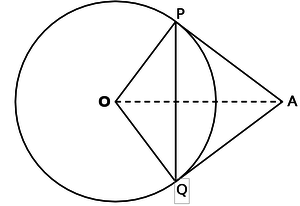
Interpretation of the problem
- O is the centre of the circle and tangents AP and AQ are drawn from an external point A.
- OP and OQ are the radii.
- The students have to prove thne angle PAQ=twise the angle OPQ.
Geogebra file
Concepts used
- The radii of a circle are equal.
- In any circle the radius drawn at the point of contact is perpendicular to the tangent.
- The tangent drawn from an external point to a circle a] are equal b] subtend equal angle at the centre c] are equally inclined to the line joining the centre and extrnal point.
- Properties of isoscles triangle.
- Properties of quadrillateral ( sum of all angles) is 360 degrees
- Sum of three angles of triangle is 180 degrees.
Algorithm
OP=OQ ---- radii of the same circle
OA is joined.
In quadrillateral APOQ ,
∠APO=∠AQO= [radius drawn at the point of contact is perpendicular to the tangent]
∠PAQ+∠POQ=
Or, ∠PAQ+∠POQ=
∠PAQ = -∠POQ ----------1
Triangle POQ is isoscles. Therefore ∠OPQ=∠OQP
∠POQ+∠OPQ+∠OQP=
Or ∠POQ+2∠OPQ=
2∠OPQ=- ∠POQ ------2
From 1 and 2
∠PAQ=2∠OPQ
Problem-2
In the figure two circles touch each other externally at P. AB is a direct common tangent to these circles. Prove that
a). Tangent at P bisects AB at Q
b). ∠APB=90° (Exescise-15.2, B.3)
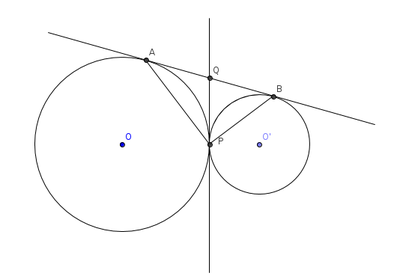
Interpretation of the problem
- In the given figure two circles touch externally.
- AB is the direct common tangent to these circles.
- PQ is the transverse common tangent drawn to these circles at point P.
- Using the tangent properties students have to show AQ=BQ and ∠APB=90°
Concepts used
- The tangent drawn from an external point to a circle
a) are equal
b] subtend equal angle at the center
c] are equally inclined to the line joining the center and external point. - Angle subtended by equal sides are equal.
- Axiom-1:- "Things which are equal to same thing are equal"
[Click here for geogebra animation]
Algorithm
In the above figure AB is direct common tangent to two circles and PQ is the Transverse common tangent.
a)
AQ=QP and BQ=QP (Tangents drawn from external point are equal)
By axiom-1, AQ=BQ
∴tangent at P bisects AB at Q.
b)
Let ∠QBP=x˚
∴∠QPB=x˚ (∵PQ=BQ)
Now Let ∠PAQ=y˚
∠QPA=y˚ (∵ PQ=AQ)
∴In △PAB
∠PAB+∠PBA+∠APB=180˚
y˚+x˚+(x˚+y˚)=180˚
2x˚+2y˚=180˚
2(x˚+y˚)=180˚
x˚+y˚=90˚
∴ ∠APB=90˚
problem 3 [Ex-15.2 B.7]
Circles and touch internally at a point A and AB is a chord of the circle intersecting at P, Prove that AP= PB.
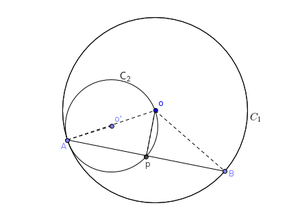
Concepts used
- The radii of a circle are equal
- Properties of isosceles triangle.
- SAS postulate
- Properties of congruent triangles.
Prerequisite knowledge
- The radii of a circle are equal.
- In an isosceles triangle angles opposite to equal sides are equal.
- All the elements of congruent triangles are equal.
Algoritham
In ∆AOB
AO=BO [Radii of a same circle]
∴ ∠OAB = ∠OBA --------------I [∆AOB is an isosceles ∆}
Then,
In ∆AOP and ∆BOP,
AO = BO [Radii of a same circle]
OP=OP [common side]
∠OAP = ∠OBP [ from I]
∴ ∆AOP ≅ ∆BOP [SAS postulate]
∴ AP = BP [corresponding sides of congruent triangles ]
problem-4
In the given Quadrilateral ABCD , BC=38cm , QB=27cm , DC=25cm and AD⊥DC find the radius of the circle.(Ex:15.2. A-6)
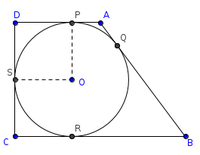
Interpretation of problem
- In the quadrilateral ABCD sides BC , DC & QB are given .
- AD⊥DC.
- Asked to find the radius OS or OP
Concepts used
- Tangents drawn from an external point to a circle are equal.
- In a quadrilateral, if all angles are equal and a pair of adjacent sides are equal then it is a square
- In a circle, the radius drawn at the point of contact is perpendicular to the tangent
Algorithm
In the fig BC=38 cm and BQ=27 cm
BQ=BR=27 cm (∵ by concept 1)
∴CR=BC-BR=38-27=11 cm
CR=SC=11 cm (∵ by concept 1)
DC=25 cm
∴ DS=DC-SC=25-11=14 cm
DS=DP=14 cm (∵ by concept 1)
Also AD⊥DC, OP ⊥ AD and OS ⊥ DC
∠D=∠S=∠P=90˚
⇒ ∠O=90˚
∴ DSOP is a Square
SO=OP=14 cm
hence Radius of given circle is 14 cm
Problem 5 [Ex-15.2-B8]
A circle is touching the side BC of △ABC at P. AB and AC when produced are touching the circle at Q and R respectively. Prove that AQ = [perimeter of △ABC].
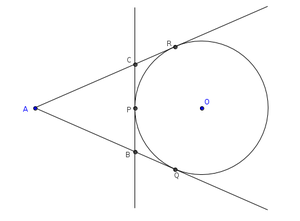
Algorithm
In the figure AQ , AR and BC are tangents to the circle with center O.
BP=BQ and PC=CR (Tangents drawn from external point are equal) ---------- (1)
Perimeter of △ABC=AB+BC+CA
=AB+(BP+PC)+CA
=AB+BQ+CR+CA ------ (From eq-1)
=(AB+BQ)+(CR+CA)
=AQ+AR ----- (From fig)
=AQ+AQ -- --- (∵AQ=AR)
=2AQ
∴ AQ = [perimeter of △ABC]
Problem-6 [Ex-15.4-B3]
In circle with center O , diameter AB and a chord AD are drawn. Another circle drawn with OA as diameter to cut AD at C. Prove that BD=2OC.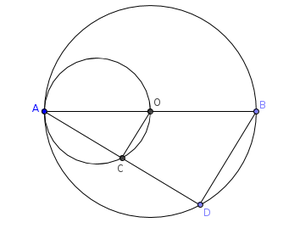
Algorithm
In figure, AB is the diameter of circle and AO is the diameter of the circle
in △ADB and △ACO
∠ADB=90° and ∠ACO=90° [∵angles in the semi circles]
∠DAB=∠CAO [∵common angles]
∴△ADB∼△ACO [∵equiangular triangles are similar]
∴== [∵corresonding sides of a similar triangles are proportional]
But AB=2OA----1 (∵diameter is twice the radius of a cicle)
=
from (1)
=
∴BD=2OC
Problem-7 [Ex-15.4-A3]
In the figure AB=10cm,AC=6cm and the radius of the smaller circle is xcm. find x.
Interpretation of the problem
- In the given figure two circles touch internally.
- OB and OF are the radii of the semicircle with center "O".
- PC and PF are the radii of the circle with center "P".
Ex 4.4.2
- Suppose two chords of a circle are equidistant from the centre of the circle, prove that the chords have equal length.
DATA :- Let AB & CD are the two chords which are equidistant from the centre 'O' of the circle. [ Here OP is the perpendicular distance from the centre O to the chord AB and OQ is the perpendicular distance from the centre O to the chord CD] OP = OQ.
TO PROVE :- AB = CD,
CONSTRUCTION :- Join OA & OD.
PROOF :-
{[Consider In ∆AOP & ∆DOQ OA = OD OP = OQ Angle APO = Angle DQO ∆AOP ≡ ∆DOQ AP = DQ Let AB = AP + BP = AP + AP = 2AP AB = 2DQ ---------- 1. and CD = CQ + DQ = DQ + DQ CD = 2DQ --------- 2. From equtn 1 & equtn 2 AB = CD
Radii of the circle Equi distances from circle
SAS Axiom
Acording to properties of SAS axiom.
Perpendicular drawn from centre to chord which bisect the chord, i.e. AP = BP.
Perpendicular drawn from centre to chord which bisect the chord, i.e. CQ = DQ Acording to AXIOM-1]}
angle
| Steps | Explanation |
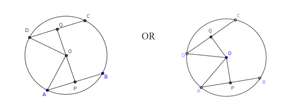
|
Explanation for thestep |
| Write the step | Explanation for thestep |
|}









